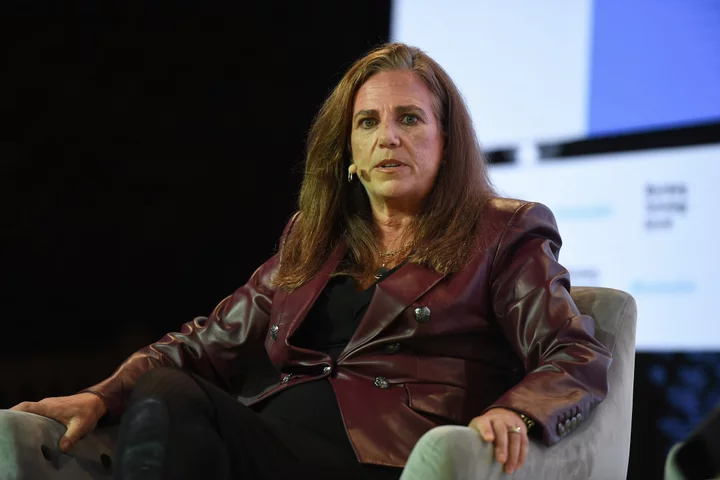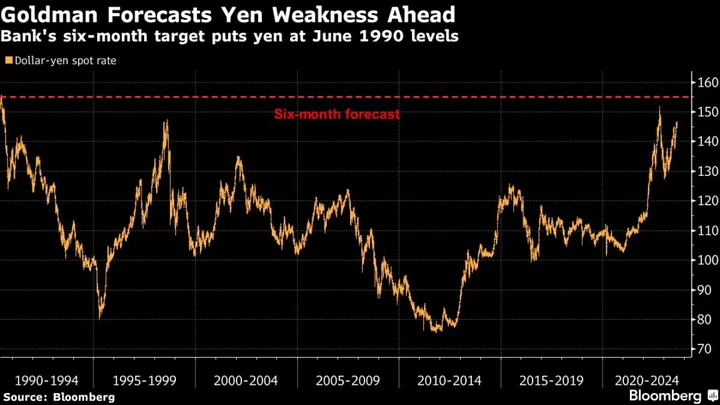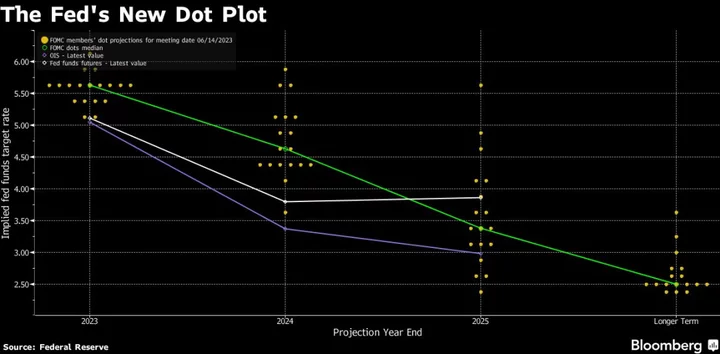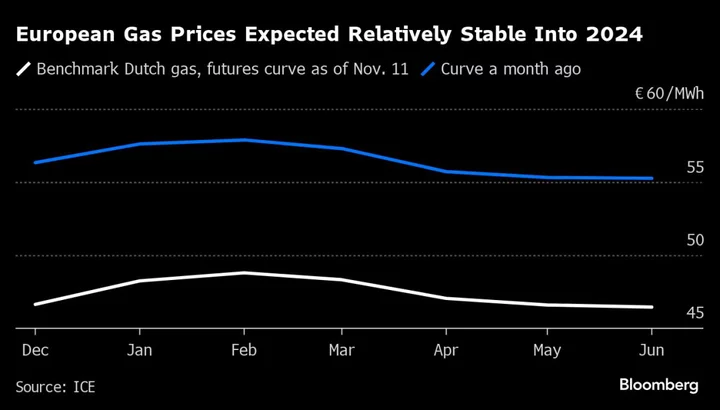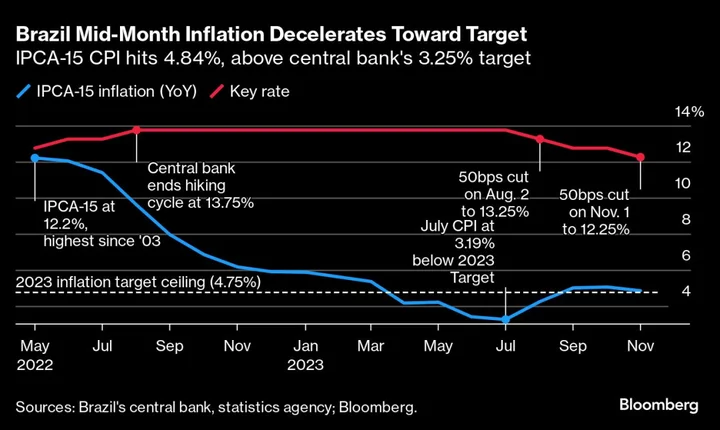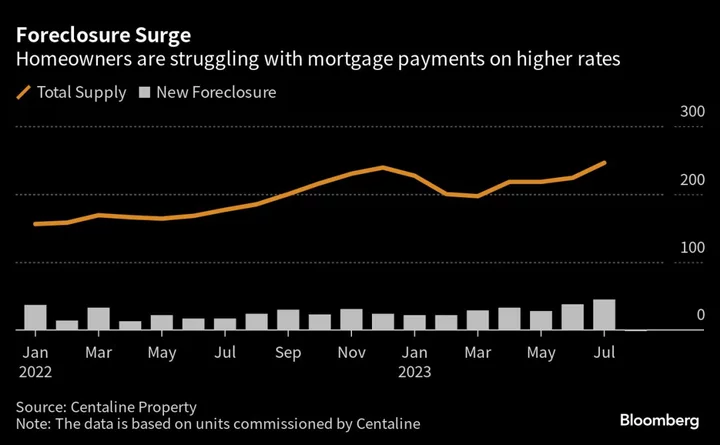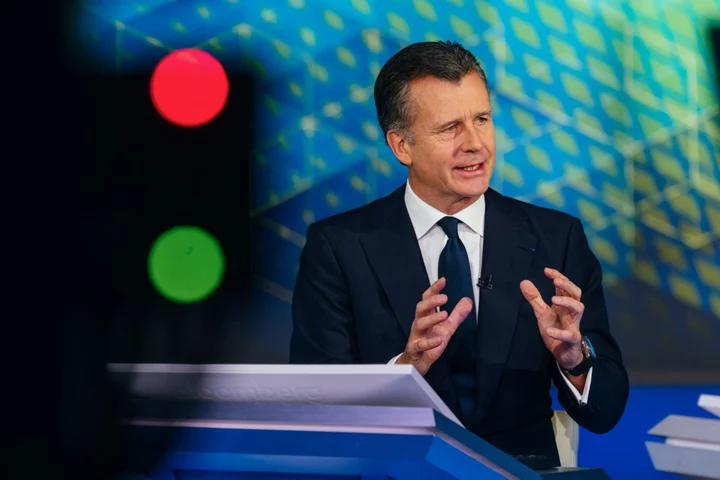Europe needs to start investing more in defense technology, including robotics, hardware and artificial intelligence to protect itself, said Florian Seibel, the chief executive officer of German drone startup Quantum Systems.
Russia’s war in Ukraine was “a wake-up call for European resilience,” Seibel said in an onstage interview at the Bloomberg Technology Summit in London. “The only way we can protect what we have in Europe is by investing in technology, in automation, in robotics that can monitor our borderlines. That’s exactly what we’re doing.”
European Union regulations around drones have held back the continent from developing more advanced systems, allowing it to fall behind countries including China, and should be revised, Seibel said. Toy drones from China available online outperform some European drones, he said.
“If we as a society do not want our kids to fight Chinese war robots we need to start acting now,” he said.
Bloomberg hosted its annual European Technology Summit, focused on the world’s most pressing problems — from climate change to geopolitical tensions — and how tech companies are simultaneously trying to solve and survive them. Discussions have revolved around artificial intelligence, clean technology, the escalating race to dominate the chip industry and tech policy, among other things.
Watch LIVE here. All times are local in London.
Monzo Gains Strength as UK Customers Seek Economic Boost (5:45 p.m.)
Sujata Bhatia, Monzo Bank Ltd. chief operating officer, said the digital bank is “coming into their own” with 8.4 million customers as people seek different investing options.
“You might be saying this is the wrong time to launch investment products, but we found a quarter of people are saying this cost of living crisis is making them think about investing ore than ever,” she said during an interview Tuesday on Bloomberg Television. “We want to help them build that muscle.”
Bhatia said Monzo offers assistance to customers looking to invest by making it easier than typical financial institutions and providing a one-stop-shop for customers on simple savings solutions or visibility on their mortgage. The company is listed as one of Bloomberg’s 25 UK startups to watch.
Synthesia CEO Says Technology Can Blunt AI Disinformation (5:30 p.m.)
Victor Riparbelli, CEO of UK startup Synthesia Ltd., said disinformation from artificial intelligence-generated videos can be prevented with watermarks and other technical solutions.
“I think the ultimate solution to this is fingerprinting content so we can build a providence chain of where content came from, who created it and watch the original unedited version of it,” Riparbelli said during an interview on Bloomberg Television. Fake video and images from the Israel-Hamas war have fueled questions around disinformation in generated AI.
Riparbelli added Synthesia is working with Adobe Inc. and Alphabet Inc.’s Google to build a digital history of AI video creation.
“I have a lot of optimism that this technology will be a part of the media landscape within a couple years,” he said. Riparbelli added that AI technology is not necessarily new, rather generated content is “having its moment.”
Earlier Tuesday, Riparbelli said at the Bloomberg Technology Conference in London that 47% of Fortune 100 companies are customers of the startup’s computer-generated avatars.
Deliveroo Is Fielding 10,000 Job Applications a Week (4:21 p.m.)
The British online food-delivery company Deliveroo is fielding 10,000 job applications a week in the UK and is “100% committed” to remaining in the country, Chief Executive Officer Will Shu said Tuesday.
The UK tech market “gets a bit of a negative rap, but we’ve been very happy with the talent we’ve been able to hire here,” Shu said in an onstage interview at the Bloomberg Technology Summit in London. Deliveroo, based in London, went public in the UK in 2021. Despite the tight labor market in the UK, Shu said, he’s seen plenty of applicants from people looking to work on the platform.
“In the tightest labor market that the UK has seen pretty much since the lifting of restrictions, we’ve had the highest rider retention,” Shu said.
Drone Startup Quantum Systems Raises $67 Million (4:03 p.m.)
While participating in the Bloomberg Tech Summit, Quantum Systems, the German drone company that was backed by Peter Thiel and has been operating in Ukraine since the Russian invasion, announced it had raised €63.6 million ($67 million) in new funding.
Series B round was led by HV Capital and DTCP Capital, and backed by Airbus Ventures, Thiel Ventures and Project A, the Munich-based company said in a statement on Tuesday. It comes after the startup signed a deal with the German army for its Vector reconnaissance drones.
ABBA Voyage Show Has Sold Roughly 1.8 Million Tickets (3:50 p.m.)
About 1.8 million tickets have been sold for ABBA Voyage, the three-dimensional show set in London, featuring avatars of the Swedish band.
“It is way ahead of the expectations,” said Per Sundin, chief executive officer of Pophouse Entertainment, the project’s lead investor. The total project cost is set to be between $100 million and $200 million, and the show could break even sooner than planned as Pophouse is in advanced talks with four cities around the world to replicate the success. “Abba can perform in different places every night,” Sundin said.
When asked about future plans for other artists, Sundin said Abba would not be the last artist to do this. “A lot of artists want to do this. It would be wonderful to take the Beatles back,” he added.
UK Chip Chief Says Europe Risks ‘Century of Humiliation’ (3:40 p.m.)
Struggling British chip designer Graphcore Ltd. would be faring better in the US, where there’s more investment and support for computing technology, according to the startup’s chief executive officer.
“We’d probably have it easier if we moved to the US,” Nigel Toon said, and warned that the UK and Europe could enter a “century of humiliation” if it failed to invest enough in new technology.
Read more: Europe Tech Risks ‘Century of Humiliation,’ Graphcore CEO Says
UK May Allow Big Tech to Keep Some Appeal Rights (2:33 p.m.)
The British government may allow Big Tech to retain some rights to appeal antitrust decisions, Secretary of State for Science, Innovation and Technology Michelle Donelan said at the summit.
Donelan was responding to a Bloomberg report earlier on Tuesday that appeals would be limited for rulings by the new Digital Markets Unit within the regulator, the Competition and Market Authority, as it applies extra scrutiny to major tech companies.
The government is examining “the nature of the grounds on which you can appeal under,” she said, while also seeking to assuage concerns from all sizes of companies.
“We are listening, absolutely we do listen throughout the passage of any the bill,” Donelan said, referring to the Digital Markets, Competition and Consumers Bill. “The bill is designed to level the playing field and prioritize competition which is to the benefit, especially of consumers but also innovation.”
CMA Director Details Review of AI Foundation Models (2:20 p.m.)
The UK’s antitrust watchdog is working on an initial review of AI foundation models in order to develop a set of proposals on how to regulate the technology, Will Hayter, senior director of the CMA’s Digital Markets Unit, said.
It’s looking for “classic issues on the competition side,” Hayter said. “If you have market power leading up, you can have direct impact on consumers,” he said, citing fake AI generated reviews.
Synthesia CEO Proposes a Blockchain to Detect Deepfakes (1:00 p.m.)
A digital fingerprinting process where videos and images are registered, similar to a blockchain, could help identify AI-generated content and deepfakes, Synthesia Chief Executive Officer Victor Riparbelli said.
“We should be able to figure out where this piece of content comes from, who did the original version, and has it been edited? This is a very difficult technical problem,” he said.
Riparbelli pointed to the music industry, which uses audio recognition tools to detect if songs infringe on copyrights. “With the right incentive structures we can get to a world where we can consume trusted content. And if we are watching something that isn’t verified, it’s obvious,” he said.
Machine Learning Is Not a Silver Bullet for Climate (12:10 p.m.)
Machine learning can have a major impact on how companies and governments handle climate change questions, but it is not a “silver bullet,” said Sims Witherspoon, climate and sustainability lead at Google DeepMind.
“It is a very powerful tool for a specific set of problems,” she added.
Witherspoon will feature in a new episode of Bloomberg’s AI IRL to air next month.
UK Is Set to Reject Big Tech Call for Antitrust Appeals Route (12:00 p.m.)
UK ministers are poised to reject Big Tech calls to be able to appeal against decisions made by the country’s antitrust regulator under new digital markets rules, people familiar with the matter told Bloomberg.
The government plans to use the new Digital Markets Unit within the regulator, the Competition and Market Authority, to apply extra scrutiny to companies such as Alphabet Inc. and Meta Platforms Inc., and to curb their dominance. A decision is expected within the next two months.
Will Hayter, senior director of the CMA’s Digital Markets Unit, is speaking at the summit this afternoon.
Panelists Clash on if AI is Opportunity or Threat (11:45 a.m.)
Artists are starting to see AI as an “opportunity and not a threat,” according to Oleg Stavitsky, chief executive officer and co-founder of generative music startup Endel.
Endel has already partnered with Grimes, James Blake and Miguel, with artists becoming more open to AI projects, Stavitsky said.
Not everyone agrees. Many artists are having their intellectual property stolen, according to Hilary Krane, chief legal officer at Creative Artists Agency, who joined Stavitsky on stage.
“Maybe you can create a better product if you can steal from other people,” she said. “We’re going to see competition in the models, if users can get their heads around demanding that what they use not be based on stolen goods.”
Musical Artists Are Warming to AI, Endel Founder Says (11:30 a.m.)
Musical artists are starting to embrace AI, according to Endel’s Stavitsky.
“Artists themselves are much more open to actually experimenting with this technology, because they see an opportunity rather than a threat,” he said.
Read More: Synthesia Sells Its AI Avatars to 47% of Fortune 100, CEO Says
Endel takes the original tracks of famous songs, known as “stems,” to create ambient tracks for relaxation or focus — a category Stavitsky said has exploded in popularity on streaming services such as Spotify Technology SA and YouTube.
He also announced a new deal Endel had signed with Rhino, a Warner Music label, to synthesize Roberta Flack’s song Killing Me Softly into three AI-generated soundscapes, which he demonstrated on stage.
European AI Startups Don’t Need Own Foundational Models (10:55 a.m.)
European startups should build applications rather than their own AI models to rival OpenAI, Google and Meta Platforms Inc., according to Rebeca Tristan, head of operations at business planning platform Pigment.
“I don’t believe there is a lot of value in focusing on building foundational models,” said Tristan. Pigment, based in France, relies on OpenAI for its own product.
Still, players in France and Germany have promising technology, said Ben Blume, partner at Atomico, pointing to Mistral and Aleph Alpha.
European companies can gain advantage by building products and services that comply with EU’s AI Act, a set of rules around the use of the technology, added Tristan.
AI Companies Should Race to Develop Safe Systems (10:30 a.m.)
Companies building artificial intelligence should “race” to develop “safe and ethical” systems on their own – because the tech will be much more powerful sooner than expected, according to Jared Kaplan, co-founder and chief science officer at Anthropic.
“We think AI is going to get much, much more capable very soon,” said Kaplan. “The risks become more serious.”
Anthropic, which is in talks to raise at a $30 billion valuation, says it develops “constitutional AI,” models like its service, Claude, built with safeguards to avoid bias, misinformation and other problems. It’s one of the companies invited to the UK government’s AI Safety Summit next week.
Kaplan said his startup was open to regulation, but argued that policymakers have few ways to constrain AI models given the pace of development. “The technology is moving so quickly that it’s very difficult to know what actions governments can take,” he said.
Siemens Chair Warns of China Cornering Battery Market (10 a.m.)
Europe needs to develop its own energy supply chain to prevent China from cornering the battery market, according to Siemens AG Chairman Jim Hagemann Snabe.
Snabe said the EU must avoid a repeat of the solar panel industry, where China undercut providers elsewhere by lowering prices. “We should not let that happen in batteries,” he said.
European companies have called for the continent to respond to the Inflation Reduction Act in the US, a bill that sparked billions of dollars of new investment.
Clean Tech Money Flowing Into Costlier Areas (9:45 a.m.)
Investing in clean tech has fallen from the flurry of activity a few years ago, but some leading figures in European clean tech see a revival around the corner.
Venture investors are beginning to put more money into more cost-intensive areas, such as water infrastructure and carbon capture, Raphaele Leyendecker, managing director at Techstars Sustainability Paris, said at the tech summit. “The interest is shifting from software to hardware,” she said.
Investors have poured money into nuclear fusion, one of the more expensive and unproven approaches to energy production. First Light Fusion’s Markus said companies like his can use artificial intelligence to bring about fusion energy more efficiently. He predicted that people could be charging their iPhones using nuclear power from the grid by the next decade.
Samir Abboud, CEO for geothermal heating company Innargi, said Europe has a more immediate need: “The big elephant in the room is actually heating,” he said. EU countries have spent an estimated €3.2 billion ($3.4 billion) on fossil fuels to heat homes and offices in 2022. Many countries have relied on natural gas from Russia. “That time is over now,” said Abboud.
Cyber Experts Say ‘You Can’t Secure Everything’ (8:55 a.m.)
Corporate executives need to accept the fact that they can’t protect every data point and focus on securing their most critical assets in the aftermath of high-profile cyberattacks, Cyberstarts general partner Emily Heath said.
In an interview at the tech summit, Heath said companies need to identify “the most important thing” to them, understand where it lives in their systems and then focus on protecting that. “You can’t secure everything,” she said. “Hone in on the things that matter.”
‘Nonhuman Identity’ Space Is Ripe for Disruption (8:50 a.m.)
If there is one space in cybersecurity that is “ripe for disruption,” it’s the area of “nonhuman identity” — a term used by the industry to describe digital and physical objects that interact with other systems such as devices and artificial intelligence tools, Cyberstarts general partner Emily Heath said at the tech summit.
“We’ve gotten really good at human identities — there are solutions out there for that,” Heath said. “The concept of nonhuman identity has exploded, but there is not as much disruption for nonhuman identities.”
Dominique Shelton Leipzig, privacy and cybersecurity partner at Mayer Brown, said one of the best things a chief executive officer can do to protect their assets is to speak publicly about it. “Just being visible” makes a company’s cybersecurity strategy 85% more successful, Shelton Leipzig said. “It sets the tone.”
Read More: The UK’s Best Hope for Tech Prowess Sits in Its Labs, Not Apps or AI

